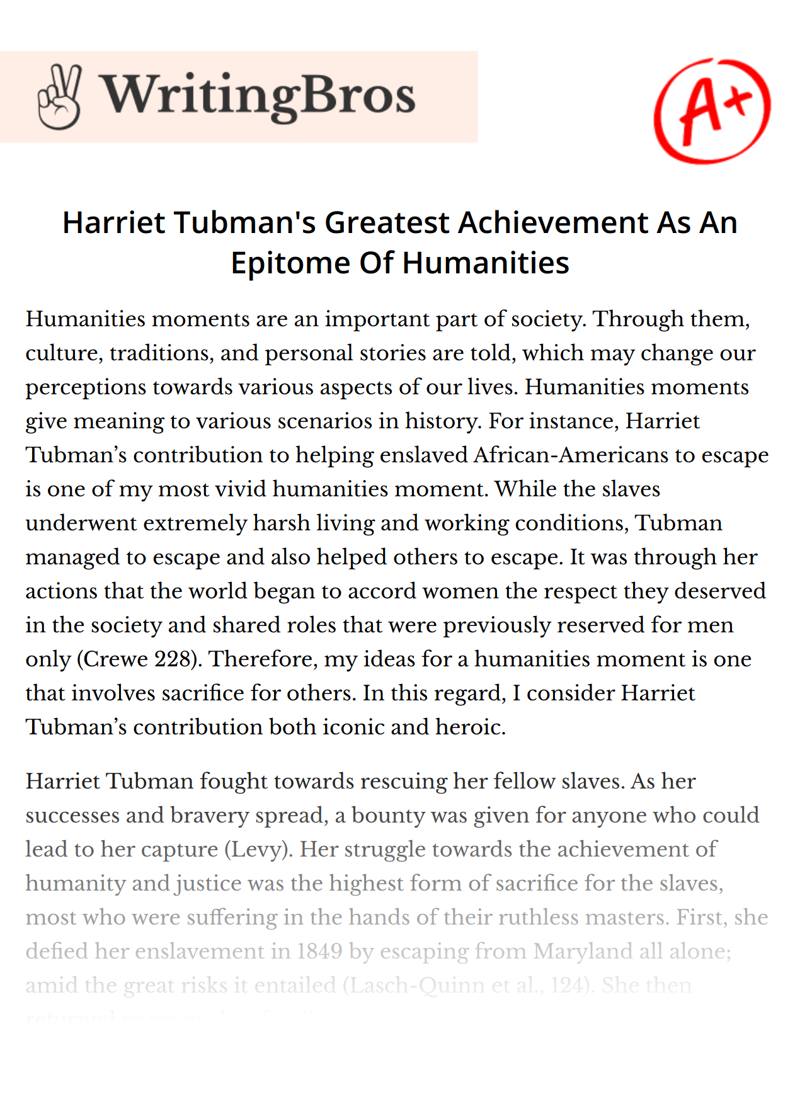Harriet Tubman's Greatest Achievement As An Epitome Of Humanities

Humanities moments are an important part of society. Through them, culture, traditions, and personal stories are told, which may change our perceptions towards various aspects of our lives. Humanities moments give meaning to various scenarios in history. For instance, Harriet Tubman’s contribution to helping enslaved African-Americans to escape is one of my most vivid humanities moment. While the slaves underwent extremely harsh living and working conditions, Tubman managed to escape and also helped others to escape. It was through her actions that the world began to accord women the respect they deserved in the society and shared roles that were previously reserved for men only (Crewe 228). Therefore, my ideas for a humanities moment is one that involves sacrifice for others. In this regard, I consider Harriet Tubman’s contribution both iconic and heroic.
Harriet Tubman fought towards rescuing her fellow slaves. As her successes and bravery spread, a bounty was given for anyone who could lead to her capture (Levy). Her struggle towards the achievement of humanity and justice was the highest form of sacrifice for the slaves, most who were suffering in the hands of their ruthless masters. First, she defied her enslavement in 1849 by escaping from Maryland all alone; amid the great risks it entailed (Lasch-Quinn et al., 124). She then returned to rescue her family members and friends, as she led them to the Underground Railroad. Her bravery still echoes in America today, more than a century after her death. The world continues to seek gender and racial equality, long after the death of Harriet Tubman. In most societies, modern-day slavery is perpetrated by some individuals engaging in human trafficking. Besides, racism and discrimination of women continue to be observed in some parts of the world.
Tubman rose above all odds to drive the rescued slaves to the North, where slavery had been abolished. After her own escape, she rescued about 70 other people, most of them being her family members and their friends. During the Civil War, she participated in the Combahee river raid, where about 700 freed slaves were rescued, many who joined the union army (Lasch-Quinn et al., 124) She never allowed any risks to stop her. For instance, many women slaves never took the escape route alone due to the dangers involved, but Tubman was the first woman to undertake the journey. Today, she is recognized as a significant symbol of the anti-slavery era (Levy). Her head injury that she sustained as a child did not deter her from being the savior to her people. Levy further notes that she was illiterate and thus, she has no personal records about herself.
Harriet Tubman will forever remain as an iconic freedom fighter and a defender of justice in the history of slavery and women in society. Her actions have helped me see the potential of women in society and the impact of a woman in building society. Her actions have greatly influenced my perception of the world by providing an insight into the price of freedom. She has encouraged me and other like-minded individuals to join hands and advocate for gender and racial equality while upholding all human rights. Although Harriet died, her legacy lives on to inspire generations to appreciate how far humanity has come and the role each one of us can play in supporting her course to achieve equality and freedom for all.
Cite this Essay
To export a reference to this article please select a referencing style below

